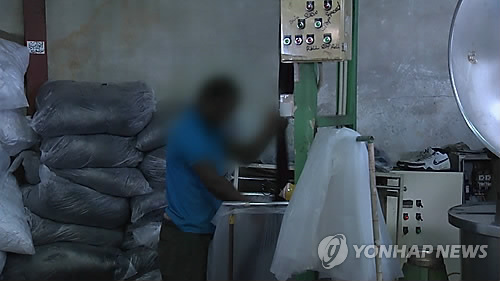South Koreans have become more negative toward migrant workers compared to four years ago amid the prolonged economic downturn, a poll showed Wednesday.

A foreign worker works on a machine at a factory (Yonhap)
According to the Overseas Koreans Foundation survey of 820 people July 31-Aug. 25, 61.1 percent of the respondents residing in the country’s seven largest cities find it hard to accept foreign workers as members of Korean society. The figure is up 3.6 percentage points from a 2013 survey.
Some 39 percent of the surveyed said that they recognize foreign workers as members of society, down 3.6 percentage points from four years ago, according to the poll.
The term “foreign workers” used in the poll refers to foreigners who are allowed to work in the country for three years under a low-skilled work permit system. There are about 260,000 foreign workers in Korea under the scheme, out of 1.27 million foreigners living in the country as of May last year, according to Statistics Korea.
About 57 percent of the respondents said that they were not concerned about foreign workers staying in the country long term, while 13.4 percent were against it. Some 29 percent answered “it depends on the country which they come from.”
Asked whether they think Koreans are closed toward or discriminatory against foreigners or foreign culture, 57.1 percent agreed, while 9.5 percent disagreed.
As to the idea of a homogenous society, Koreans appear to be more open-minded than before. Asked whether the growing presence of foreigners would harm the purity of the Korean race, only 27.6 percent said “yes,” down from 41 percent in 2013. Some 42 percent said “no,” up from 31.8 percent.
On international marriages, 34.3 percent of the surveyed singles said they were willing to marry foreigners, while 65.7 percent answered negatively. As marriage partners, the surveyed favored those who came from North America the most, followed by Europe, Japan, the former Soviet Union, China and Oceania, Latin America. Those from the Middle East, Asia and Africa were the least popular.
Concerning ethnic Korean-Chinese people working here, 45.9 percent of the surveyed reported a neutral view. Some 22 percent saw it positively as they help fill labor shortages. About 12 percent viewed it negatively because jobs for locals would diminish.
Concerning ethnic Koreans from the former Soviet Union finding work here, 53.5 percent had a neutral view, 20 percent viewed it positively and 10.4 percent replied negatively.
“I think the negative perception of foreigners is growing due to a prolonged economic slump,” said Lee Sung-joon, a senior member of GRI Research in charge of the poll, adding it was an obstacle to Korean society seeking to turn itself into multicultural society.
By Ock Hyun-ju (
laeticia.ock@heraldcorp.com)






![[KH Explains] How should Korea adjust its trade defenses against Chinese EVs?](http://res.heraldm.com/phpwas/restmb_idxmake.php?idx=645&simg=/content/image/2024/04/15/20240415050562_0.jpg&u=20240415144419)